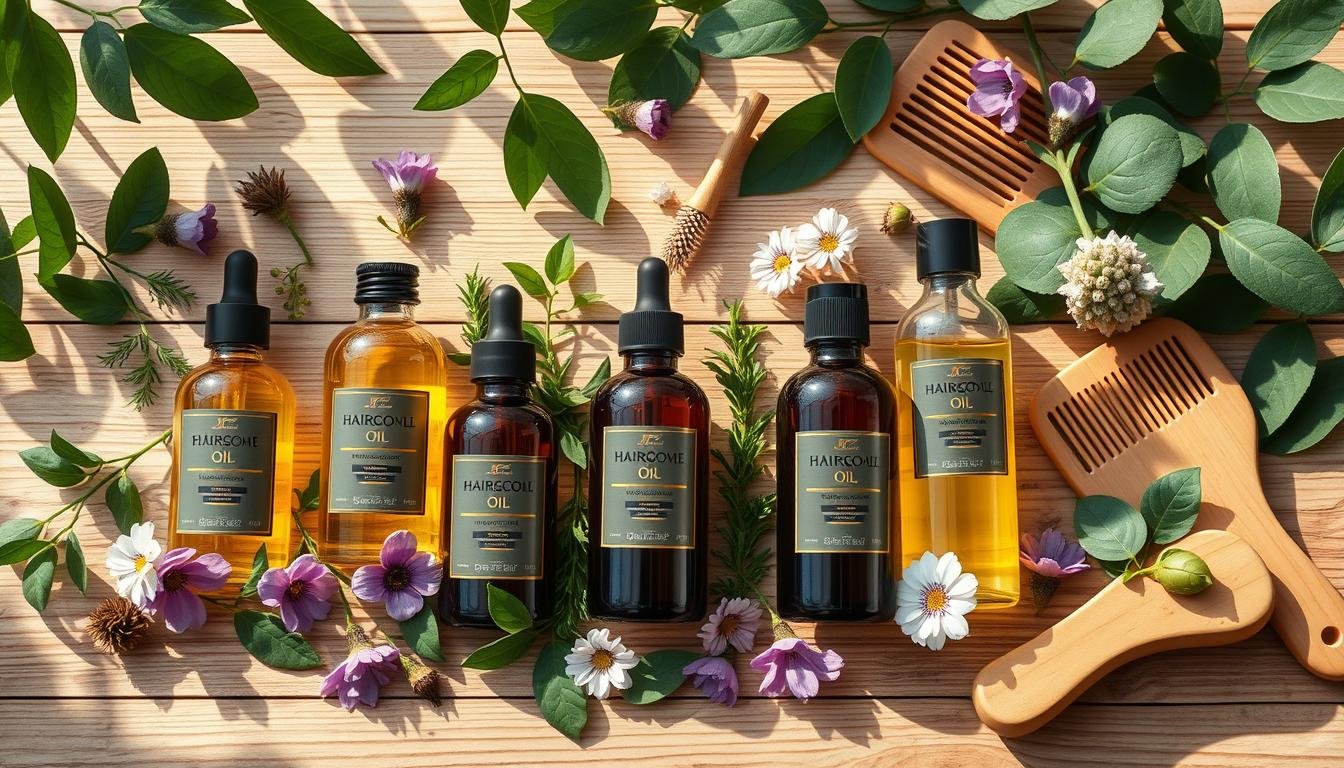What Are the Pros and Cons of Hair Oils?
Did you know that a 2015 study found oils can help revive hair with a much-needed moisture boost? Hair oiling is an ancient practice rooted in Ayurvedic medicine, involving the application of natural oils to hair and scalp. It aims to increase moisture, luster, and shine while potentially reducing hair loss. The practice has gained popularity beyond its cultural origins, with many people incorporating it into their hair care routines.
Hair oils can provide various benefits, including strengthening hair strands, preventing protein loss, and improving overall hair health. However, there are also potential drawbacks to consider, such as the risk of over-oiling and attracting pollutants. In this article, we’ll explore the pros and cons of using hair oils to help you make an informed decision about incorporating them into your hair care routine.
Key Takeaways
- Hair oils can provide a moisture boost and strengthen hair strands.
- Certain hair types, such as dry and coarse hair, may benefit more from oiling.
- Moderation is key when using hair oils to avoid greasiness and buildup.
- Selecting the right oil based on individual hair needs is essential for optimal results.
- Regular hair oiling may help protect hair from damage caused by pollution and chemicals.
Introduction to Hair Oils
Hair oils have long been a staple in traditional hair care regimens, particularly in South Asian cultures. These natural or formulated products offer a wealth of benefits for hair nourishment, frizz control, and overall hair health. From the familiar coconut oil to the increasingly popular argan and moringa oils, the world of hair oils is vast and diverse.
What Are Hair Oils?
Hair oils are versatile hair care products that are applied directly to the hair and scalp. These oils can be derived from a variety of Natural sources, such as plants, nuts, and seeds, or they can be synthetically formulated. Hair oils are prized for their ability to nourish, hydrate, and protect the hair, helping to combat dryness, frizz, and damage.
Popular Types of Hair Oils
- Coconut oil: Deeply penetrating and known for its moisturizing properties.
- Argan oil: Rich in antioxidants and fatty acids, ideal for taming frizz and adding shine.
- Jojoba oil: Mimics the hair’s Natural sebum, helping to balance moisture levels.
- Almond oil: Packed with vitamins and minerals to strengthen and nourish the hair.
- Castor oil: Renowned for its ability to stimulate hair growth and reduce dandruff.
How Hair Oils Are Used
Hair oils can be incorporated into your hair care routine in various ways. They can be used as a pre-shampoo treatment, a leave-in conditioner, or a styling aid to tame flyaways and add shine. Applying hair oils through gentle massage techniques can also help improve scalp health and promote hair growth. The versatility of hair oils allows for customized application methods to address individual hair needs and concerns.
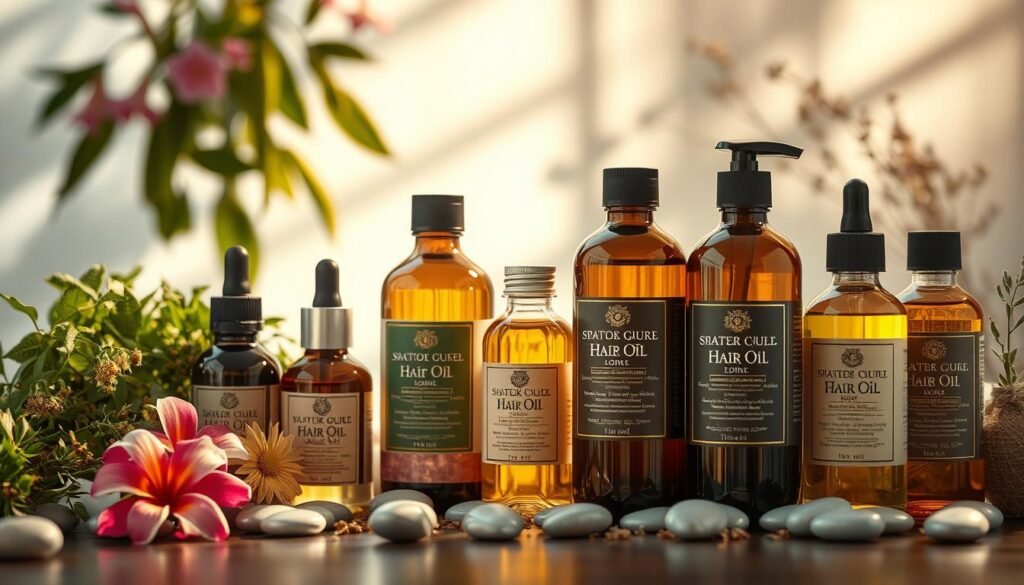
Benefits of Hair Oils for Hair Health
Hair oils offer a wealth of benefits for the health and appearance of your tresses. From providing deep nourishment and hydration to strengthening hair strands and reducing frizz, these versatile hair care products can transform your locks.
Nourishment and Hydration
Hair oils, such as coconut and argan oil, can penetrate the hair shaft to deliver essential nutrients and moisture. This helps combat dryness and brittleness, leaving your hair soft, supple, and manageable. Regular use of hair oils can lock in hydration, preventing breakage and split ends.
Strengthening Hair Strands
Certain hair oils, like coconut and sesame oil, can help strengthen the hair from within. They can reduce protein loss, reinforcing the hair’s natural structure and resilience. This improved integrity can lead to longer, healthier-looking hair over time.
Reducing Frizz and Enhancing Shine
Hair oils create a protective barrier around each strand, helping to smooth the cuticle and reduce frizz. This leaves your hair with a sleek, glossy finish and a healthy, radiant shine. Massaging oils into the scalp may also stimulate blood circulation, potentially promoting hair growth.
In addition to their hair nourishing benefits, some oils like coconut and sesame have antibacterial and antifungal properties that can help maintain scalp health and prevent Dandruff. Whether you have curly, straight, or color-treated hair, the right hair oil can be a game-changer for your hair care routine.
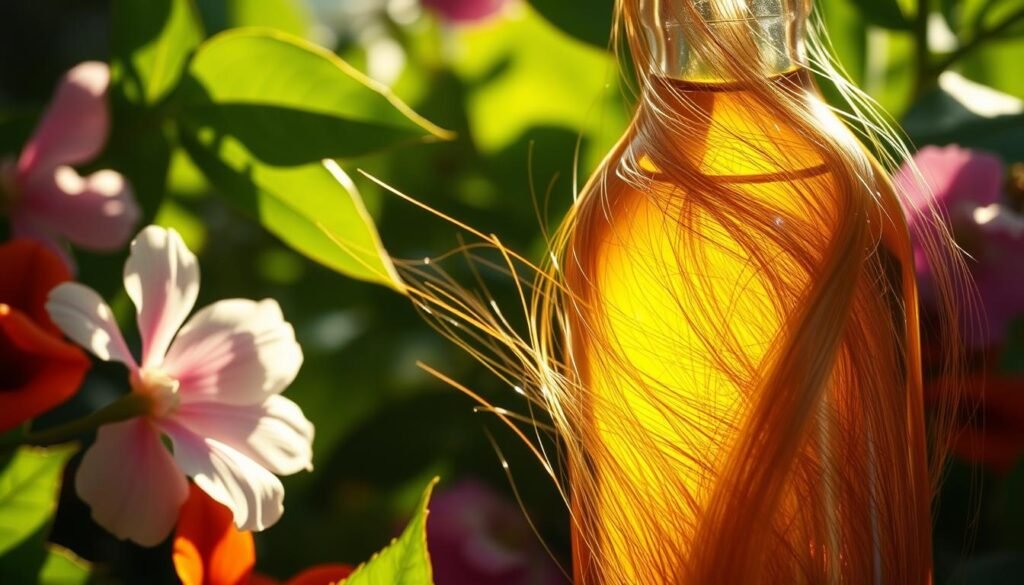
“Oiling my hair with coconut oil has transformed the texture and reduced my frizz significantly. It’s a game-changer for my hair health.”
Different Hair Types and Suitable Oils
When it comes to hair care, one size does not fit all. Each hair type has unique needs, and the right hair oil can make a significant difference in its health and appearance. By understanding the compatibility between hair types and natural ingredients, you can nourish your locks and achieve the desired results.
Oils for Curly Hair
Curly hair often craves intense moisture and definition. Oils like coconut and castor are excellent choices, as they are heavier in nature and can effectively penetrate the hair shaft. These oils help to reduce frizz, enhance curl pattern, and leave strands soft and manageable.
Oils for Straight Hair
Individuals with straight hair may benefit from lighter oils such as argan or jojoba. These oils provide nourishment without weighing down the hair, helping to maintain a sleek and shiny appearance. They also help to control flyaways and add a touch of natural luster.
Oils for Color-Treated Hair
Color-treated hair requires extra care to preserve its vibrancy and prevent damage. Almond and moringa oils are particularly beneficial, as they are rich in vitamins and antioxidants that help to protect the hair’s integrity and maintain color vibrancy. These oils also provide deep conditioning to keep color-treated hair looking healthy and vibrant.
It’s important to note that individual hair characteristics, such as thickness, porosity, and scalp health, can also influence the choice of suitable hair oils. Ayurvedic practices suggest selecting oils based on your dosha (vata, pitta, or kapha) for a more personalized approach to hair nourishment.
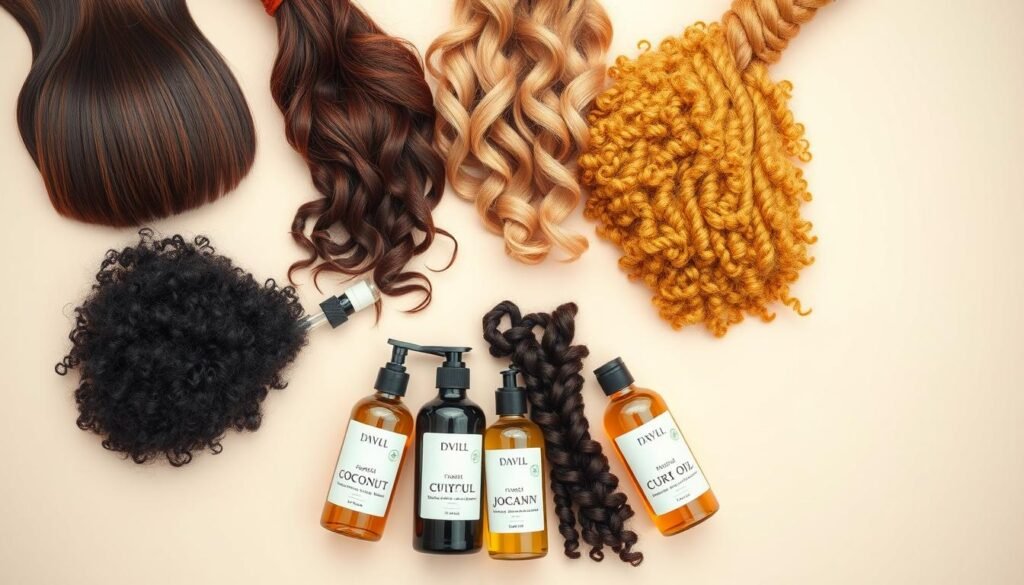
“Choosing the right hair oil is crucial for achieving optimal hair health and appearance. By understanding the specific needs of your hair type, you can unlock the full potential of natural ingredients to transform your locks.”
The Role of Essential Oils
Essential oils are concentrated plant extracts that have been gaining attention in the world of natural hair care. These potent oils offer a range of benefits for hair and scalp health, making them a valuable addition to any hair care routine. Let’s explore the fascinating world of essential oils and how they can enhance the vitality and appearance of your tresses.
What Are Essential Oils?
Essential oils are highly concentrated, aromatic compounds extracted from various parts of plants, such as flowers, leaves, stems, and roots. These oils are known for their ability to provide therapeutic benefits, including hair nourishment and scalp health support.
Popular Essential Oils for Hair
- Rosemary oil: Stimulates hair growth and improves scalp circulation.
- Lavender oil: Promotes hair growth, reduces stress, and has a calming aroma.
- Peppermint oil: Invigorates the scalp, increases blood flow, and may help with hair loss.
- Tea tree oil: Possesses antimicrobial properties that can address scalp issues like Dandruff.
- Ylang-ylang oil: Helps balance sebum production and has a soothing effect on the scalp.
Benefits of Essential Oils
Essential oils offer a wealth of benefits for hair and scalp health. They can stimulate hair growth, nourish the hair and scalp, and address specific concerns like dandruff, itchiness, and dryness. Some essential oils, such as rosemary and peppermint, have even been shown to be as Effective as conventional hair growth Treatments like minoxidil. Additionally, essential oils can help improve the overall condition of the hair, leaving it more vibrant, shiny, and manageable.
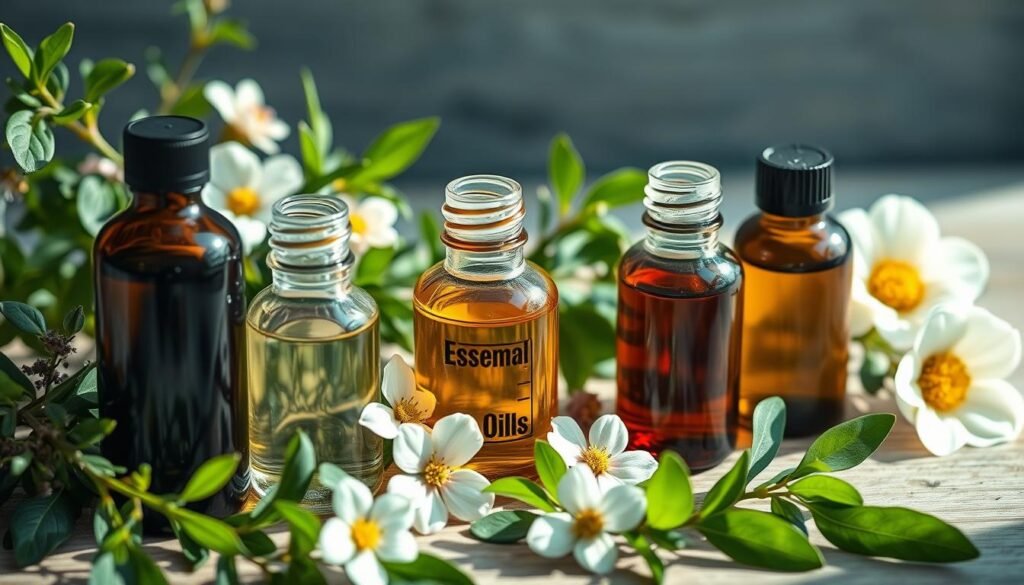
“Essential oils are a game-changer in the world of natural hair care. They offer a holistic approach to nourishing and revitalizing your locks.” – Alison, Hair Care Specialist
When it comes to incorporating essential oils into your hair care routine, it’s important to dilute them with a carrier oil, such as coconut, argan, or jojoba oil, to ensure safety and effectiveness. Start with a small amount and gradually increase the concentration as needed. With the right essential oils and proper application, you can unlock the full potential of your natural hair nourishment and scalp health.
How to Apply Hair Oils Effectively
Incorporating hair oils into your routine can be a game-changer for nourishing and rejuvenating your locks. However, to reap the full benefits of these potent elixirs, it’s crucial to understand the proper application techniques. Let’s dive into the essentials of using hair oils effectively.
Choosing the Right Amount
When it comes to hair oils, less is often more. A pea-sized amount for short hair or slightly more for longer styles is typically sufficient. Applying too much can lead to a greasy, weighed-down appearance. Start with a small amount and gradually increase as needed, focusing on the ends and mid-lengths of your hair.
Techniques for Application
- Massage the oil into your scalp using gentle, circular motions to stimulate blood flow and promote hair growth.
- Once the scalp is covered, distribute the remaining oil through the length of your hair, focusing on the dry or damaged areas.
- For a deep conditioning treatment, apply the oil liberally from roots to ends and leave it on overnight before washing it out in the morning.
Recommended Frequency of Use
The frequency of hair oil application can vary depending on your hair type and needs. As a general guideline, most experts recommend using hair oils 2-3 times per week for best results. If you have very dry or damaged hair, you may benefit from more frequent applications, while those with oily hair may find that once a week is enough.
Remember, it’s essential to avoid over-oiling, as this can lead to buildup, greasiness, and potentially clogged follicles. Experiment with different application techniques and frequencies to find the routine that works best for your hair.
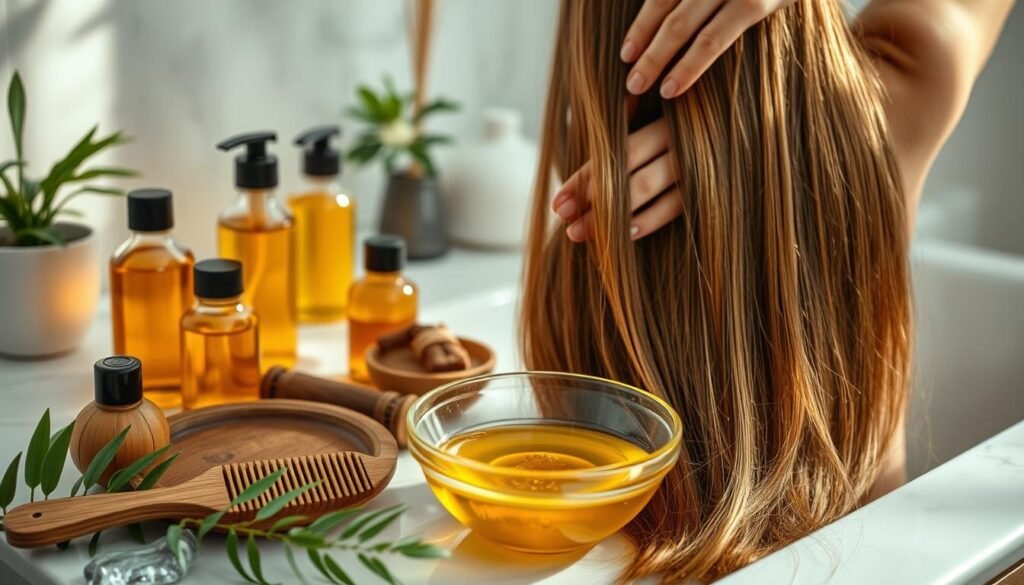
“Proper hair oil application is key to unlocking the full potential of these nourishing Treatments. By using the right amount and technique, you can achieve healthier, more vibrant-looking hair.”
Possible Drawbacks of Hair Oils
While hair oils offer numerous benefits for nourishing and improving hair health, it’s important to be mindful of their potential drawbacks. Excessive or improper use of hair oils can lead to undesirable effects that may outweigh their advantages.
Greasiness and Residue
Over-application of certain hair oils, especially for those with fine or naturally oily hair, can result in a greasy, heavy feeling and leave an unpleasant residue on the scalp and hair. This can make the hair appear limp, dull, and difficult to manage.
Risk of Allergic Reactions
Some individuals may experience allergic reactions to specific oils, particularly essential oils, when used on the hair and scalp. This can manifest as redness, itching, or even irritation. It’s crucial to patch-test any new oil before widespread application to ensure compatibility with one’s hair type and skin sensitivity.
Hair Buildup Over Time
Consistent use of heavy, occlusive oils without proper cleansing can lead to a gradual buildup on the hair and scalp. This potential buildup may clog follicles, contributing to issues like dandruff, acne, and even hair loss. Regular shampooing and occasional deep cleansing are essential to prevent such unwanted accumulation.
| Oil | Potential Drawbacks |
|---|---|
| Rosemary Oil | In a 2015 study, rosemary oil was found to be as Effective as minoxidil in increasing hair count over six months, suggesting potential benefits. However, more research is needed to establish its long-term efficacy and safety. |
| Peppermint Oil | A 2020 review indicated that there is no clinical evidence supporting the use of peppermint oil in managing hair loss in humans. |
| Lavender Oil | Research on lavender oil in a 2016 study showed an increase in the number and depth of hair follicles in mice, suggesting potential hair growth benefits. However, more studies are needed to confirm its efficacy in humans. |
| Castor and Coconut Oils | Some oils, like castor and coconut oils, can clog pores, potentially causing Dandruff and acne. They may not be suitable for all hair types, especially those prone to oily buildup. |
It’s important to note that hair oils may not be effective in all cases of hair loss, particularly when the underlying cause is related to conditions like anemia or other medical factors. Consulting a healthcare professional is recommended to determine the most suitable approach for individual hair care needs.
“Overusing hair oil can lead to hair fall and Dandruff by clogging hair follicles,” warns Dr. Smita Naram, a renowned dermatologist.
Ultimately, the use of hair oils requires a balanced approach, taking into account factors such as hair type, texture, overall health, and the surrounding climate. Proper application techniques, frequency of use, and regular cleansing are crucial to maximizing the benefits of hair oils while mitigating potential drawbacks.
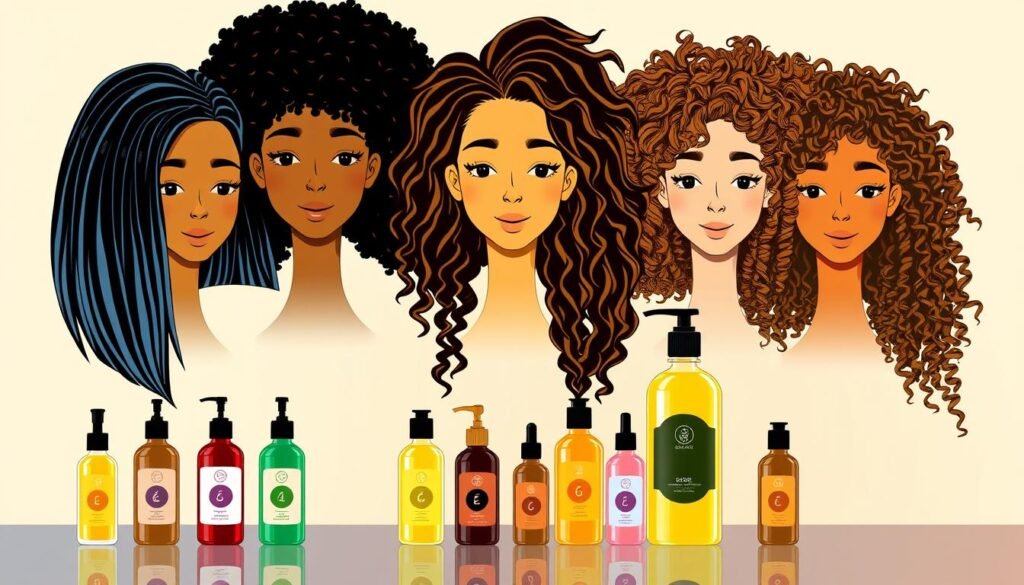
Tips for Selecting Quality Hair Oils
When it comes to maintaining the health and nourishment of your hair, the right choice of hair oils can make all the difference. As you explore the vast array of options, it’s crucial to read the ingredient labels carefully and prioritize pure, natural oils that are free from synthetic additives or fillers.
Reading the Ingredients Label
The first step in selecting a quality hair oil is to thoroughly examine the ingredients list. Look for oils that are cold-pressed, unrefined, and derived from natural sources. Avoid products that contain petroleum-based ingredients, as these can clog pores and weigh down your hair, compromising its natural product quality and hair nourishment.
Avoiding Synthetic Additives
When it comes to hair oils, less is often more. Steer clear of products that boast a long list of synthetic chemicals, fragrances, or preservatives. These can interfere with the natural natural ingredients of the oil, potentially causing irritation or buildup over time.
Recommendations for Popular Brands
- Parachute: Known for their high-quality, cold-pressed coconut oil that nourishes and conditions hair.
- Banyan Botanicals: Offers a range of Ayurvedic-inspired hair oil blends, crafted with a focus on natural ingredients and hair nourishment.
- Moroccanoil: Their signature argan oil is renowned for its ability to tame frizz, enhance shine, and protect hair from damage.
When possible, consider opting for organic and sustainably sourced hair oils to ensure the highest quality and environmental responsibility.
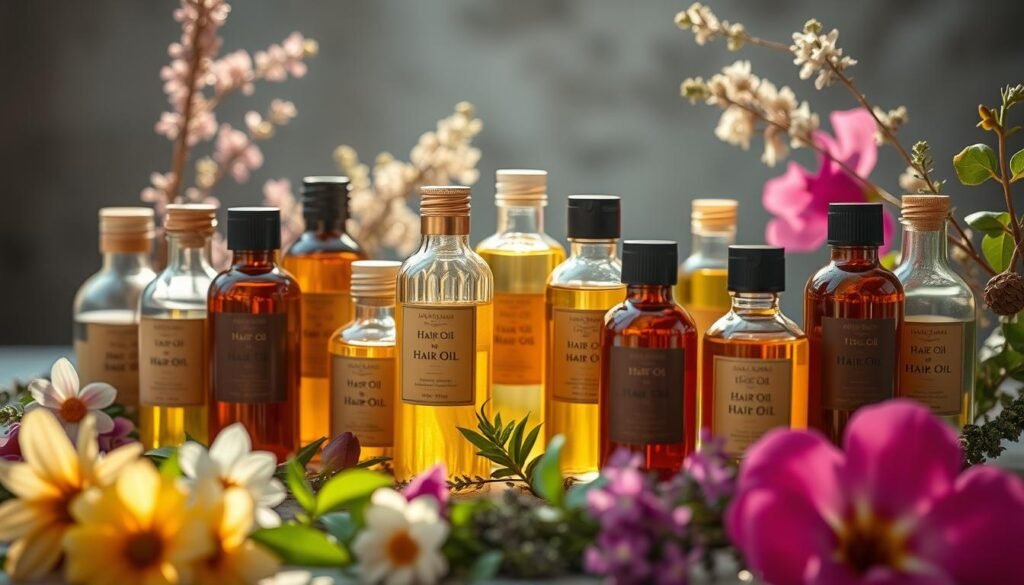
“Choosing the right hair oil can be a game-changer for your locks, but it’s essential to read the labels and prioritize natural, high-quality ingredients.”
DIY Hair Oil Blends
Embracing the power of natural ingredients can be a game-changer for your hair health. Creating your own DIY hair oil blends allows you to tailor your hair care routine to your specific needs, whether it’s nourishing dry strands, promoting scalp health, or encouraging hair growth.
Common Ingredients for DIY Blends
The foundation of any DIY hair oil blend typically consists of a carrier oil, such as coconut, jojoba, or almond oil. These oils provide essential fatty acids, vitamins, and minerals to hydrate and strengthen your hair. To enhance the benefits, you can add a few drops of potent essential oils, like rosemary, peppermint, or lavender, each of which offers unique properties for hair nourishment and scalp health.
Simple Recipes for Hair Oils
- Coconut Oil and Lavender: Combine 2 tablespoons of coconut oil with 5 drops of lavender essential oil for a soothing, moisturizing blend.
- Castor Oil and Peppermint: Mix 1/4 cup of castor oil with 10 drops of peppermint essential oil to create a stimulating, growth-promoting formula.
- Jojoba Oil and Rosemary: Blend 3 tablespoons of jojoba oil with 7 drops of rosemary essential oil for a nourishing, anti-dandruff treatment.
Tips for Customizing Blends
When customizing your DIY hair oil blends, consider your hair type, scalp condition, and specific concerns. Experiment with different carrier and essential oils to find the perfect combination that addresses your hair nourishment and scalp health needs. Always perform a patch test before applying a new blend to ensure your skin and hair are compatible.
“Investing in high-quality, natural ingredients for your DIY hair oil blends can make all the difference in the health and appearance of your hair.”

Conclusion: Weighing the Pros and Cons
Summary of Benefits and Drawbacks
Hair oils offer a range of potential benefits, from enhanced moisture and strength to improved shine and reduced frizz. Coconut oil, for instance, has been studied for its ability to penetrate the hair shaft and protect it from water damage. Other oils, such as almond, jojoba, and argan, have been shown to increase the hair’s luster and overall health. However, potential drawbacks of hair oiling include the risk of product buildup, scalp irritation, and greasiness, particularly with excessive use or improper application.
Making the Right Choice for Your Hair Care
The effectiveness of hair oils largely depends on individual hair type, application technique, and product quality. Consulting with a hair care professional, such as a dermatologist or trichologist, can provide personalized guidance on the best oils and usage methods for your specific hair care needs. Factors like hair texture, porosity, and lifestyle should also be considered when incorporating hair oils into your routine. Experimentation and patience may be required to find the right balance and maximize the benefits while minimizing any potential drawbacks.
FAQ
what are the benefits of using hair oils?
Hair oils provide numerous benefits for hair health, including deep nourishment and hydration, strengthening hair strands, reducing frizz, enhancing shine, and promoting overall hair texture improvement.
what are the potential drawbacks of using hair oils?
Potential drawbacks of using hair oils include the risk of greasiness and residue, especially for those with fine or naturally oily hair. Over-application can also lead to product buildup over time, potentially causing scalp issues or dull-looking hair. Some individuals may also experience allergic reactions to certain oils.
How do I choose the right hair oil for my hair type?
The choice of hair oil depends on your individual hair type and needs. For curly hair, heavier oils like coconut or castor oil can provide intense moisture and definition. Straight hair may benefit from lighter oils such as argan or jojoba to avoid weighing down the strands. Color-treated hair can benefit from nourishing oils like almond or moringa to help maintain color vibrancy and prevent damage.
What are the benefits of using essential oils for hair?
Essential oils, such as rosemary, lavender, peppermint, and tea tree, can provide various benefits for hair, including stimulating hair growth, balancing scalp oil production, and addressing specific hair concerns like dandruff or itchiness.
How do I properly apply hair oils?
Effective hair oil application involves using the right amount, typically a pea-sized amount for short hair and slightly more for longer hair. Massage the oil into the scalp using circular motions, then distribute it through the hair. For deep conditioning, leave the oil on overnight and wash it out in the morning.
How can I create customized DIY hair oil blends?
Creating DIY hair oil blends allows for customization based on individual hair needs. Common ingredients include carrier oils like coconut, jojoba, or almond, combined with essential oils for added benefits. When customizing blends, consider your hair type, scalp condition, and specific concerns.
